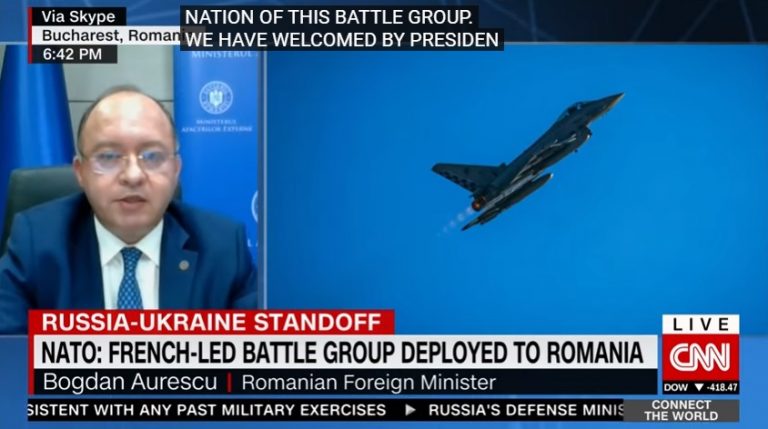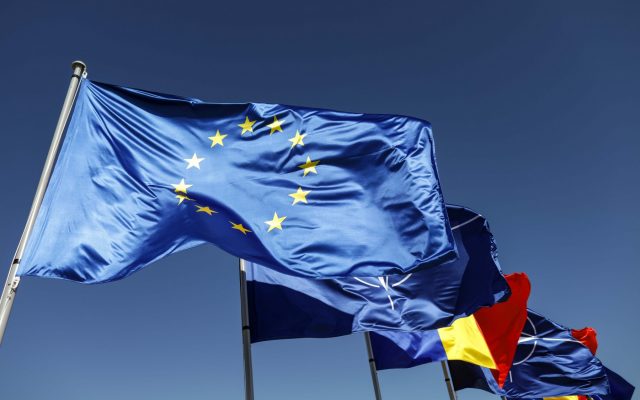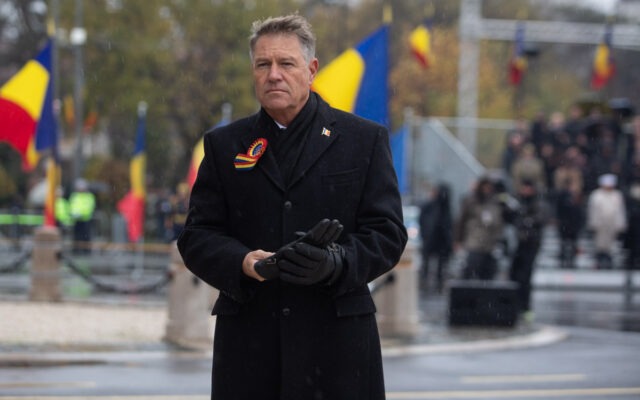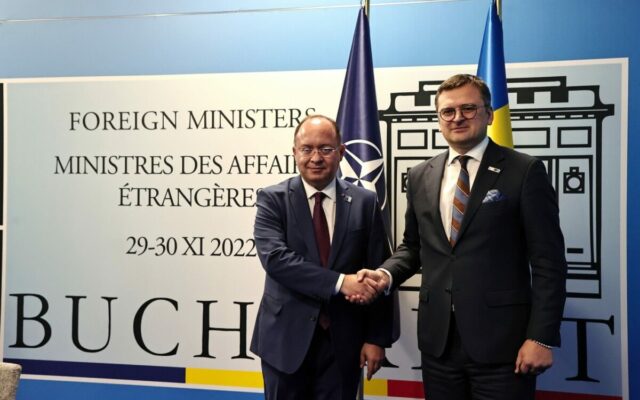
VIDEO Aurescu la CNN: Dacă Rusia recunoaște independența Donbas ar fi o clară încălcare a dreptului internațional / Sper ca grupul de luptă NATO ce va fi creat în România să aibă aceeași dimensiune ca cele din Polonia și baltice
Bogdan Aurescu, ministrul de Externe, a declarat joi la CNN că România e pregătită să găzduiască un grup de luptă NATO cu Franța ca națiune-cadru și din care să facă parte și soldați americani. El a adăugat că declarațiile Rusiei privind retragerea trupelor de la granița cu Ucraina ”nu sunt confirmate pe teren” și a avertizat că o eventuală recunoaștere de către Moscova a independenței regiunii separatiste Donbas ar fi o ”încălcare evidentă a dreptului internațional”.
Urmărește cele mai noi producții video G4Media
- articolul continuă mai jos -
Principalele declarații ale lui Aurescu la CNN:
– În ciuda declarației Rusiei că sunt gata de dialog și că au retras trupele de la granița cu Ucraina, acestea nu au fost confirmate pe teren
– Am văzut că Duma de Stat a propus președintelui Rusiei să recunoască independența regiunilor separatiste din Ucraina. Dacă asta se va întâmpla, ar fi o clară încălcare a dreptului internațional
– Sperăm ca Grupul de Luptă NATO ce va fi creat în România să aibă aceeași compoziție și mărime ca cele create deja în partea nordică a flancului estic NATO – Polonia și țările baltice
– Ar fi binevenită prezența altor aliați, alături de trupele franceze, posibil și americane, în acest Grup de Luptă
– (Despre pretențiile Rusiei): Nu putem permite să existe două tipuri de aliați NATO, de primă mână și de mâna a doua, aliați fără trupe și echipamente militare pe teritoriul lor. Este inacceptabil, a fost deja respinsă ideea, și NATO e foarte unită și solidă
– Nimic nu poate înlocui NATO în ce privește asigurarea apărării și securității colective în Europa. Europa poate face mai multe pentru susținerea NATO, dar nu poate înlocui NATO
Interviul integral (eng):
Becky Anderson: You’re watching „Connect the World”, I am Becky Anderson, it’s 25 to 9 here in the UAE. NATO has been strengthening its presence in Eastern Europe, as you would be well aware, to bolster the bloc’s Eastern Flank. That is one of Vladimir Putin’s reasons for his aggressive military stance at present. Romania would find itself in the middle of any fight, it shares 650 kilometers of border with Ukraine and would be one of NATO’s bases of operations for defending Ukraine against Russian aggression. The US has 2,000 troops there and NATO has twice out there, as fears fighting in neighboring Ukraine might spill into the country. The Russian President sees the troops movements as a provocation which Romania’s Foreign Minister denies, saying that if you compare the Allied presence on the Eastern Flank with the troops Russia has massed, it is several times smaller, so there is no question of an attempt to escalate tensions. The Foreign Minister joins us now from Bucharest. Before we talk about what is going on in your country, we thank you for joining us, I just want to get your response to what we’ve just heard from the US Foreign Secretary, Secretary of State Antony Blinken, on the floor of the Chamber at the UN Security Council. He said this, and I quote him, “Let me be clear: I am here today not to start a war, but to prevent one”. He went on to lay out what the US believes what Russia is planning as possible pretext for an invasion. Do you share the US President’s concerns, who said any further attack on Ukraine could come in the next several days?
Bogdan Aurescu: Well, thank you so much for having me. I have followed with great attention the intervention of my colleague and friend Tony Blinken in the Security Council. I could say that I fully support his presentation and the assessment he has presented before the Security Council. I think the security situation, right now, looks very worrisome. Indeed, in spite of the declarations by the Russian side that they are ready to dialogue and that they have withdrawn troops from the Eastern border of Ukraine, well, this was not confirmed in reality, this was not confirmed on the ground.
At the same time, we’ve seen that the Russian Duma has proposed to the President of Russia to recognize as independent entities the separatist provinces in Ukraine. If this happens, it will be a clear violation of international law, because no illegal situation in international law should be recognized.
Then we have noticed the fact that President Putin used the term “genocide” during the press conference with the German Chancellor a couple of days ago. At the same time, we have noticed today the shell attacks in Eastern Ukraine.
Indeed, it looks like there is a preparation or a building of a pretext for attack, for invasion. This is, of course, unacceptable. Then, today we have noticed the fact that Minister Lavrov has forwarded the reply of the Russian side to the proposals that were forwarded on the 26th of January by the United States. Romania was involved in the preparation of that paper of the United States. But at the same time, what should have been a gesture of openness to dialogue was accompanied by declaring the deputy chief of mission of the US Embassy in Moscow as persona non grata. So the overall picture is quite worrisome.
Becky Anderson: Let’s talk about the announcement by the NATO chief that a French-led battle group could be sent to Romania. Can you provide us any further details on the size and scope of any further deployment to your country and when do you expect those soldiers to arrive?
Bogdan Aurescu: I think it’s a very important process of creation of this Battle Group, which has started during the Defense Ministerial yesterday in Brussels. As announced by Secretary General Stoltenberg yesterday, the defense ministers decided to develop options for strengthening NATO’s deterrence and defense posture, including by establishing new Battle Groups, and one of these Battle Groups could be established in Romania. We have offered to be a host nation, we have welcomed the announcement by President Macron that France would serve as a Framework Nation for this Battle Group and this process will unfold in the following weeks, and we will hopefully have a Battle Group in Romania. So, for the time being, I cannot give you exact details about the size and the composition of this battlegroup, but we have welcomed very much the announcement by France to deploy troops in Romania as part of this battlegroup.
Becky Anderson: So I am just wondering what sort of size of Battle Group you would be comfortable with? Because with these, of course, that would be in addition to the recent arrival of a thousand American soldiers and recent offers by the UK, US and others, of ships, of planes, to reinforce NATO’s Eastern Flank. Look, Jens Stoltenberg describes Romania as a strong and committed ally. As a NATO ally, how big a threat is Russia to Romania at this point?
Bogdan Aurescu: We have welcomed very much the announcement by President Biden and, then, the actual deployment of the Stryker Battalion from Germany to Romania. Secretary Stoltenberg visited Romania last week, on Friday, to welcome the first American soldiers on the Romanian soil. This is a very positive development in ensuring that the defense and deterrence posture on the Eastern Flank is consolidated.
And we hope that this Battle Group which will be created in Romania will have the same composition and size as the Battle Groups which are already created and functional in the Northern part of the Eastern Flank – in Poland and the Baltic states.
And we would welcome any presence of other allies, joining the French troops, possibly also the American troops, which might be associated with this Battle Group as well, to this NATO formation in Romania.
Becky Anderson: Ok. Let me ask you this, sir, because Russia recently issued ultimatums to NATO states to withdraw forces from Eastern Europe. Are you confident that this is an Alliance that is united, NATO that will have Romania’s back in the face of these ultimatums from Russia?
Bogdan Aurescu: Absolutely. These proposals and demands by Russia were already rejected by the Allies, including during the discussion in the NATO-Russia Council on the 12th of January. Because any kind of third party veto on what is very much linked to the core mission of NATO, which is collective self-defense, is unacceptable. This would affect Article 5 itself, which is the backbone of the Alliance. We cannot allow for having two kinds of allies, first class and second class allies – the allies on the Eastern Flank, without any kind of actual troops and equipment from other allies on their territories. This is unacceptable, it was already rejected, and NATO is very much united and solid as we speak.
Becky Anderson: There are many experts who say that what has been going on has been partly an attempt by Russia, by President Putin himself, to drive a wedge between Europeans in the bloc and NATO as an entire bloc, including the United States. In an interview with the FT today, the French foreign minister, your counterpart in France, has called for a European security shake-up, saying the current framework is “nearly obsolete” and he says it risks allowing Russia to become a permanent threat. I just wonder, is this the new normal in Europe? A state of permanent tension, that is certainly something that the NATO chief is concerned about. Do you share that concern?
Bogdan Aurescu: I share this concern and that is why NATO is taking measures to consolidate its posture and to consolidate the security of all allies. And the fact that we are discussing about the consolidation of the Eastern Flank in a unitary manner, that we are able to take decisions in that regard, as it was witnessed during the defense ministerial these days, I think it speaks volumes about how united the Alliance is.
And the fact that, within the European Union, we are trying to develop also a security dimension, this should be seen – and this is agreed as such to be seen – as complementary to what NATO does.
Nobody can replace NATO in terms of ensuring collective defense and security in Europe and the Euro-Atlantic area as a whole. Europe can do more in support of what NATO does, but it cannot replace NATO as an Alliance.
Becky Anderson: With that said, I’m going to have to leave it there, I am going to take a break. But it’s been very good to have you on. Thank you very much. It’s an important day, you laid out why extremely eloquently. We will have you back. Meantime, the best from us.
Foto: Captură CNN

Donează lunar pentru susținerea proiectului G4Media
Donează suma dorită pentru susținerea proiectului G4Media
CONT LEI: RO89RZBR0000060019874867
Deschis la Raiffeisen Bank






© 2025 G4Media.ro - Toate drepturile rezervate
Acest site foloseşte cookie-uri.
Website găzduit de Presslabs.